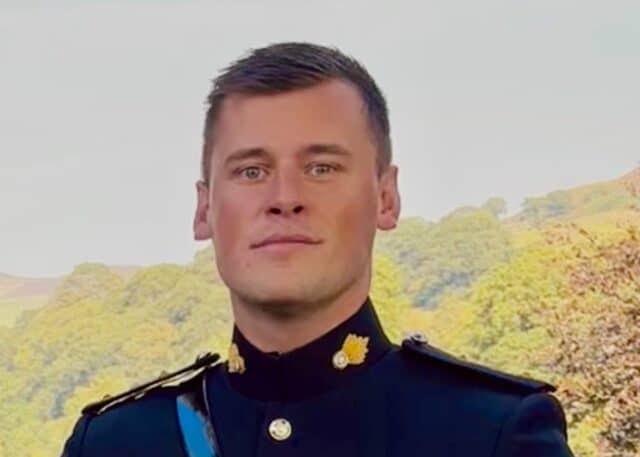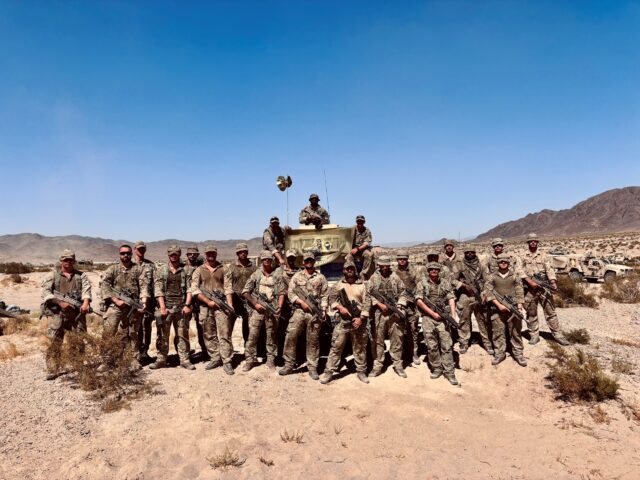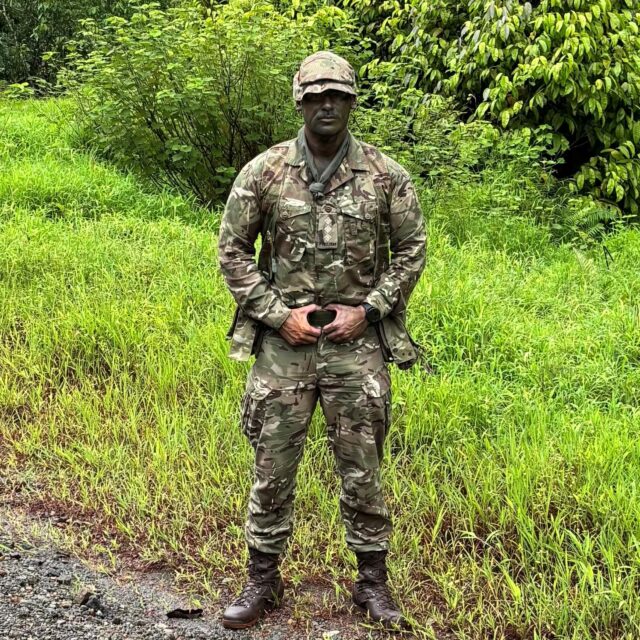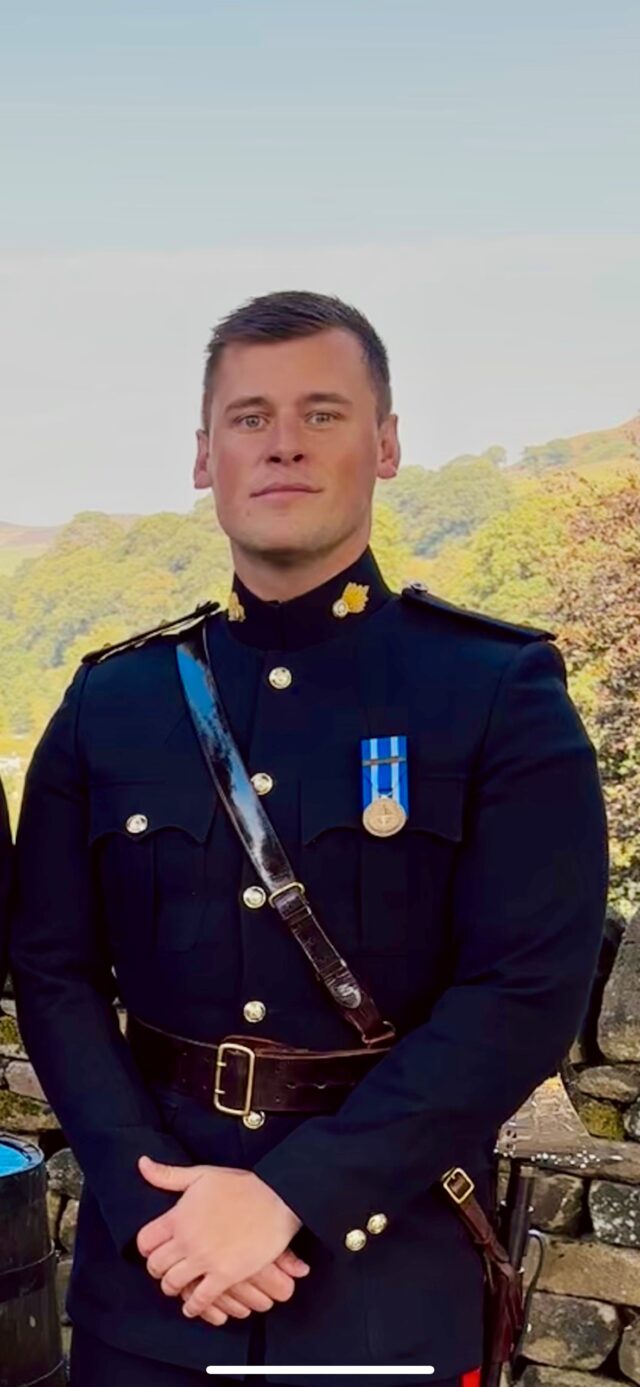
Bloxham Prepared Me for Life in the Military
Old Bloxhamist Roland Swift (Sy 12-17) recently came back to school to speak to boys in his old house about his career path into the British Army. He trained at the Royal Military Academy Sandhurst, commissioning as Second Lieutenant and is now Captain in the First Battalion, the Royal Regiment of Fusiliers.
At School, Roland was House Captain and involved in many activities outside the classroom. In drama he played Mr Birling in An Inspector Calls, and on the sports field, he was 2nd XV rugby captain, 3rd XI hockey captain and an accomplished clay pigeon shooter, but his passion was music. He was a music scholar – a member of the Chapel Choir, in many school bands and orchestras and sang numerous times at the Icarus Trust Carol Concert in London.
Tell us about your passion for music when you were at school?
I joined Bloxham on a music scholarship. I played the trumpet, drums, piano and I sang all the way through School and it filled most of my week. I had music lessons, sang in the choirs, and was part of the jazz band and the orchestra. I really enjoyed playing in lots of different performances: the Last Post, Remembrance Sunday, and similar occasions.
What A Levels did you study and how have they been useful in your career?
I studied Business, Geography and Politics. Geography has definitely been the most relevant to being in the Army. You remember things, for example, when map reading or using ground in a tactical manner and explain to some of the lads what different terrains offer and the associated constraints.
Tell us about your gap year.
I headed to Verbier in Switzerland to do a ski season as a chef. I worked in a 110-person hotel cooking breakfast, afternoon tea and dinner every day. We would start at around 5am and finish breakfast service about 10am. I would then ski around the mountains all day going to bars and get back to work for about 5pm. After evening service, we would go out all night. It was an exhausting but a 100% awesome six months of my life.
Why did you join the Army?
I always wanted to join the Army as a kid. When I was in Sixth Form and my tutor and teachers started asking me about my future plans, which to be honest were far from concrete at that time, I said I was going to join the Army. I still applied to university as it was a good second option. No one pushed me to join the Army, I did it off my own back. I wanted to test myself.

What was your time at Sandhurst like?
After a thorough interview process, I started Sandhurst during COVID, on the 17 May 2020. It was the middle of lockdown and so it was quite odd heading to starting training while most people were stuck in their houses and off work.
At Sandhurst you are trained to take on the responsibility of leading soldiers. It’s a 44-week course, spread over three terms and you have two to three weeks leave in between each term. Junior term is a purge of your senses! Your entire life sort of falls apart in the space of 10 minutes upon arrival. Every night you’re doing drill and there are room inspections at 5am, where everything in your room must be perfectly aligned, perfectly polished, and every morning, no matter how perfect your room is, the Colour Sergeant will come in there and rip it all to pieces. You have to do it all again for the next morning, just to see if you persevere and repeat the layout, as taught. There are fitness and leadership tests (including a 70km march in 30 hours over Dartmoor with a 25kg bergen), weapons handling and deploying in the field; learning how to do section attacks, reconnaissance patrols and conduct field routine. That’s when I started to feel like an actual soldier, with your kit and equipment, out in the field, conducting tactical actions and learning what I signed up to do.
During the intermediate term, the emphasis is on developing officer and leadership skills, and commanding more responsibility. You start deploying on exercise as a Platoon and take it in turns to be the Platoon Commander. It was also daunting as it was the start of Regimental Selection Boards, which is a job interview for what future regiment you want to go into. I chose the Royal Regiment of Fusiliers (which I’m in) and the Parachute Regiment. It’s a brutal process, but it works for most people, as the Army makes sure you end up in the right place and that the Regiment you go to suits you. I was lucky and I got offered both. I chose the Fusiliers, and I’ve had a brilliant time.
The final term at Sandhurst is just making sure you’re the finished product. I’m still not the finished product: I’m still developing every day, and I left Sandhurst four years ago. But you’re ready then to take on the responsibility of command and go on to phase two training, where you learn your specific trade of the Regiment that you are going to.
What has been the toughest part of your training?
Probably the Platoon Commander’s Battle Course – four months in the Brecon Beacons. We learnt everything to do with commanding an infantry platoon: orders, process, different actions you might conduct, like recce patrols, platoon attacks, defence, trench warfare and using different weapon systems. It was probably the roughest four months of my life. There were five weeks of live fire tactical training, where you combine multiple weapon systems in live attacks, assaulting positions, throwing live grenades and storming trenches. I remember crawling up to a bunker as machine gun rounds were flying above me, with a grenade in my hand, pulling the pin and then literally feeling the earth just pick me up off the floor as the grenade I posted into a bunker exploded. It is great fun and is the closest you can get to being in a firefight without being in one during training. The Army is really good at doing live fire because we make it as realistic as possible without risking life or injury and actually it’s really, really good fun.
As I entered an Armoured Infantry Regiment (we use the Warrior infantry fighting vehicle – a 36-tonne vehicle with a 30-millimetre cannon and a 7.62 machine gun mounted in the turret), part of my training was the Armoured Infantry Platoon Commanders course. I learnt how to command the vehicles, how to drive them, use the communication systems, fire the weapon systems and then command it tactically and employ it on the battlefield.
Where was your first posting?
My first role as a Platoon Commander was August 2021 to April 2023 (postings are normally two years). During that time, I commanded a Rifle Platoon of around 30 soldiers. You are responsible for leading them both in barracks and in training and operations and are essentially responsible for all their training, welfare, career progression and development. During that time, I deployed to a number of places, including India within just two weeks of taking over the job.
Where else have you been deployed to?
Each deployment generally takes you somewhere new, although having said that I have been to Germany about eight times. I went to Kosovo on Operation Sandrock, which was a NATO peacekeeping operation to northern Kosovo. We were patrolling on the Serbian border, doing vehicle checkpoints, searching houses for weapons and conducting IED searches, amongst other things. We were usually patrolling on foot or in Land Rovers but also got to conduct air insertion via American Black Hawk helicopters, allowing us to get into harder to reach areas like valleys and mountain tops.
I have also deployed on a six-month tour to Estonia on Operation CABRIT 13, 60 miles from the Russian border to guard NATO’s eastern flank. We conducted multiple exercises throughout the deployment showing force on the border. It got down to about -30 degrees. While there, I also did the Cold Weather Operators Course (CWOC), joint exercises with the Estonians, Canadians and Polish. On CWOC, you get all your kit taken from you, bar what you’re wearing, given your weapon and just told to go and survive. So, in a team of five, we went into the forest, built a shelter, started a fire and we were given a skinny little Estonian chicken. You’ve got to kill it, cook it and survive the night, which was pretty chilly as you can imagine, without any sleeping kit. Then at the end of it, you conduct the ice-breaking drill, jumping through the ice on a frozen lake and recovering yourself from the ice, and then having to dry off and get warm again.
Recently, I was on exercise in the Mojave Desert in California. I took my platoon out with about 100 other British soldiers to embed with a US armoured brigade of around 8,000 soldiers. Hundreds and hundreds of tanks, helicopters and Humvees. The scale of the exercise is unbelievable. We were in a training area which is the size of Wales. You can drive for hours through the barren desert terrain and still be in the middle of nowhere. We had daily temperatures above 50 degrees, which was the most uncomfortable thing I’ve ever experienced, far worse than being cold. I just didn’t realise you could drink so much and sweat so much. I think we were drinking about 10 or 11 litres of water a day. We did some cool work with the US Special Forces, and integrated with their snipers and did raids on enemy compounds.

Image above: Roland delivering training in Fiji
Where are you headed next?
I’m taking a three-man team to Fiji to deliver a short-term training programme, teaching the Fijians urban operations, a heavy machine guns course, jungle warfare, a mortar course and some counter terrorism training as well as sharing our tactics, and standard operating procedures and a bit of defence engagement. Politically it is great to be able to help other countries and personally, it’s great fun. Culturally, I know that we will be well looked after and have some amazing experiences and at the end, hopefully we will have a couple of weeks of holiday to sample the local beaches.
As a Captain what is your role?
At Sandhurst we had leadership training, however, although we’re technically in charge and hold command over soldiers, the whole motto of Sandhurst is “Serve, to lead”. Everything I do daily is to serve my soldiers, whether that’s helping them with their finances, with their welfare, training or their development, everything. If you look after them, they’ll work hard for you. And people sometimes get that wrong where they think they’re in charge because they’re an officer. You are in charge, but only because the soldiers trust you to be and want to work for you.
There’s great progression in the Army if you prove yourself and are committed. I went from Second Lieutenant to Lieutenant and now Captain where I advise the Battle Group Commander on the tactical employment of anti-tank weapon systems on the battlefield and integrate them into his plan. I’ll be out with my lads commanding the ISTAR (intelligence, surveillance and target acquisition and reconnaissance) group. We punch ahead of the main battle group, find the enemy, confirm where they are and then engage them to cause attrition to them before they hit our battlegroup main body.
The variety of jobs in the army is massive, and you could be anything from in the infantry, or the cavalry in tanks, engineers, doctors, nurses, logistics. I’ve got a mate who left Sandhurst and he’s never done a day in uniform. He skis and climbs mountains all year doing adventurous training. He’s got the instructor qualifications, and he has an absolutely great time doing it.
What’s next for you?
My next posting will be as the Battlegroup Intelligence Officer advising the Commanding Officer. I will advise on the most likely and most dangerous courses of action of what the enemy might do, and how our plan should be developed to win, as well as give a constant intelligence feed to the battalion of what’s happening around the world whilst we are not on operations.
How important is the camaraderie in the Army?
Being in the Army can be brutal and tough and there are times where you have to depend on each other for your life. So, camaraderie is encouraged because it matters. For example, in camp at least once a month I will plan a platoon event. I had this big space which I turned into a platoon bar. I set the lads in there and their task was to make it a place they wanted to be (they covered the walls with flags and football shirts), so that we could have our own space for our team to have social events.
It’s a bit like it was at school, I plan platoon socials like we used to plan socials in Seymour and House Dances at school. If you just know each other in a professional capacity, then you’re not really going to become mates. Whereas because we live together and socialise together, we really look out for each other. The social side is always planned into every deployment.
What values have you learnt from being in the Army?
Values and standards are a massive thing in the British Army. As an officer especially, we drill values and standards – courage, discipline, respect for others, integrity, loyalty and selfless commitment. I repeatedly get told by my soldiers that I’m the only person who’s honest with them. I always just make sure, even if I’m telling them something that’s going to ruin their week or month or year, that I’m brutally honest with them because I know at the end of the day, they appreciate this.
Two of the most important values I took from School into the Army are integrity and honesty. People will always appreciate honesty. At Bloxham when your teacher asks you why you haven’t done your prep, any excuse is just pointless because it’s going to be the same outcome. You haven’t done it, so you may just as well tell the truth.
What’s your best memory from Bloxham?
Founderstide was pretty special but looking back, I would say the day-to-day fun stuff we would get up to in Seymour. I think being in a boarding house at School, where you’re fed, you’re looked after and surrounded by your mates every day was something I look back on fondly. Ten mates all living under the same roof – you’ve known each other for years and just having fun, sometimes doing stupid things, but having a laugh together all the time.
How has Bloxham helped your career?
It is interesting as the School produces people who go into really tough careers and are highly successful. When I was up in Brecon I reflected and thought, okay, I get it now. At Bloxham, you are made to manage your time, do all the activities you can cram in, you have prep until 9pm and at the time, doing all that seems ridiculous. I think doing all the sport I did, all the music, all the lessons, along with being a prefect and having to go to meetings in the Headmaster’s office seems boring when you’re 18. But being able to manage time and responsibility has a massive impact later on in life, where you can manage stress, manage workload, manage different activities, basically balance the plates.
Bloxham pushes you and sets you up to be able to do so much in your day, which yes, is quite tiring when you’re a teenager, but it’s not that much in the big wide world. Having the ability to manage that amount of stuff, resources, time and activities, has given me a huge benefit for the future.

Back to all stories

